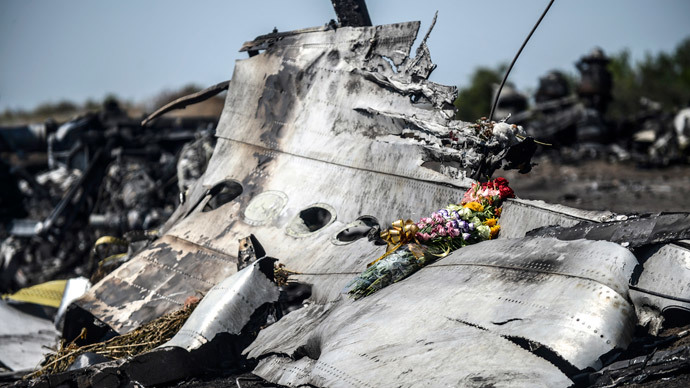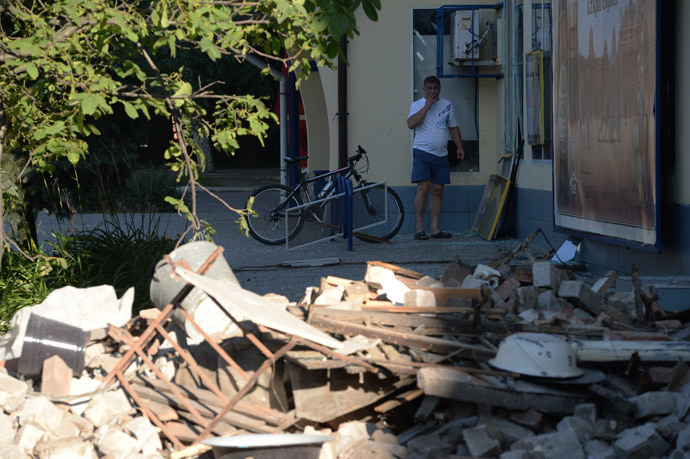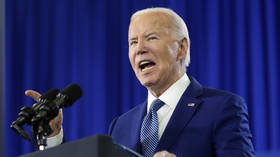MH17 tragedy: Beating drums for war in Ukraine

The shooting down of MH17 in Ukraine’s civil war is a terrible event. However, the American media and government grossly misrepresent the USA’s role in creating the current situation, and coverage of Ukraine does credit to ‘Alice in Wonderland’.
Reporting is dominated by the usual suspects from the Brookings Institution, etc. spouting jingoistic nonsense. Yes, there is significant history there, including a murky, amateurish, attempt to poison former President Victor Yushchenko with TCDD (a dioxin) in 2004 by unidentified parties. This sort of thing is a sign of the overall situation.
Let’s start with how all US media refer to the Kiev revolutionary government as the legitimate government of Ukraine. By that logic, if Tea Party-affiliated white supremacist militias based in Wisconsin and Idaho staged a rebellion that forced Barack Obama to take refuge in Canada, shut down the US government, and then those militias declared Chicago our new capital, everything would be fine.
The current Kiev government was the result of a coup by fascist-linked goons with heavy-hitter support in conservative Washington think tanks left over from the Cold War. Those Ukrainian interests had enough political clout in past decades to shut down investigations of Ukrainian war criminal collaborators with the Nazis from WWII.
So now, after Crimea was carved away from Ukraine and most of the rest of the Russian ethnics boycotted the Kiev ‘election’, surprise, surprise, the Kiev government ‘won’. I’m sorry. That’s not legitimacy. That’s a coup and a stacked deck.

Then let’s look at why Russia got so upset. The trigger was a push by the USA to bring Ukraine into NATO. Note that Sweden was front and center on that – the same government that presided over the persecution of WikiLeaks’ founder Julian Assange by suspect legal shenanigans.
It was that push to bring Ukraine into NATO, together with USA support for a revolutionary army that brought down the elected government of Ukraine which alarmed Moscow. It alarmed Moscow the way a push by Russia to bring Mexico, Texas, Alaska or California into a pan-Pacific alliance composed mostly of Russian troops might concern Washington. If that happened it would further the mission of military opposition to the USA. And keep in mind that Russia has been invaded repeatedly by Europe. Europe is peaceful now, but history shows that it can turn rapidly militaristic.
Does Russia have a right to protect itself? Does the USA? Our hands are not exactly clean in Central and South America, are they? We speak as if we are on the high ground. But are we really?
Now let’s look to the motivations of the people US media are calling ‘Russian separatists’. Why would ethnic Russians take up arms and fight against the Kiev revolutionary government? That’s obvious. They are scared. They don’t want to be attacked, beaten, denied work, killed by police, and all the rest of the oppression that would almost certainly be visited on them by Kiev’s vengeful militias behind the throne.
While Russia’s conduct relative to the Republic of Georgia (another former province) has issues, I know a woman from there who is an ethnic Russian to use as an example. Despite her family having many generations in Tbilisi, in the first year of independence she was raped regularly, sometimes more than once a day, by ethnic Georgians. She had no recourse to the law. She made her way to the USA as a refugee, where she now lives. This illustrates how those ethnic Russians in eastern Ukraine have good reason to want to be part of Russia, or at least independent of the revolutionary government in Kiev, and the only reason they are not is accidents of history.
Several months ago, Ukraine was offered large loans for development as part of a package to tilt the country toward Europe. Big loans from the IMF and World Bank sound great, as does international aid from the West. But in Eastern Europe, as Janine Wedel documented, the strange fact is that there was an inverse relationship between the amount of aid received and the health of economies 10 years after the fall of the Iron Curtain [1].

It’s not so hard to understand. It’s a version of Gresham’s law: that bad money drives out good money. Huge amounts of money falling from the sky lead to casual attitudes and unchecked greed. And those who obtain the money are aggressive and often criminal people who know what Westerners want to hear. I spoke with Badri Patarkatsishvili’s people after he fled Russia. I also knew a man working for AES Telasi in Tbilisi, who had been threatened by Patarkatsishvili. His secretary had been left across the street in a park, dead, bound with wire - part of a ‘negotiation’.
So it’s not hard to understand how pouring Western money into unprepared nations results in kleptocracy. Ukraine has had problems with kleptocrats from both the ethnic Russian population and the ethnic Ukrainian side since its inception. It is virtually guaranteed that pouring huge amounts of loans into Ukraine will mean huge amounts stolen, and the people of Ukraine left holding the bag, just like it has in many African states. That will end with handing over major Ukrainian assets to corporations with their eyes on Ukraine’s fertile farmland – just one of the prizes.
In my considered opinion, while at face value US-backed loans and aid packages look ‘better’, they are not what they appear to be.
Only if we drop the war-drum rhetoric in our media can we objectively look at Ukraine and its civil war. That’s what we should call what is happening in Ukraine – a civil war. There are no absolute bad guys, and no absolute ‘good side’. There are two peoples at war. We also need to examine how the USA helped create it.
I believe that most of those reasons are little conspiracies by Washington insiders whose motives are quite partisan. I doubt that any formal policy was pursued by the current administration, although I could be wrong. Most likely it was application of leverage by backstage parties seeking to manipulate the situation toward what they favor.
There are three parties standing to benefit, in my view. Big agriculture, the Ukrainian Cold War lobby, and - if the USA can be yanked into Ukraine through NATO - the military support companies that are starving now as Washington winds down its adventures overseas. That is a rather worrisome combination of beneficiaries.
Aside from those parties, the Clinton administration did provide a promise to Ukraine that if that country gave up its nuclear weapons the USA would guarantee its independence from Russia. However, that was many years ago and was never ratified with a treaty.
Regardless of anyone’s preconceived views, it is clear that this is a country in the grip of civil war and that both sides have legitimate concerns – as does Russia.
Brian Hanley for RT
Brian Hanley is a lecturer at Santa Clara University in California
1. Janine R. Wedel ‘Collision and Collusion: The Strange Case of Western Aid to Eastern Europe Updated Edition’ (2001) Palgrave, New York, NY
The statements, views and opinions expressed in this column are solely those of the author and do not necessarily represent those of RT.
The statements, views and opinions expressed in this column are solely those of the author and do not necessarily represent those of RT.












